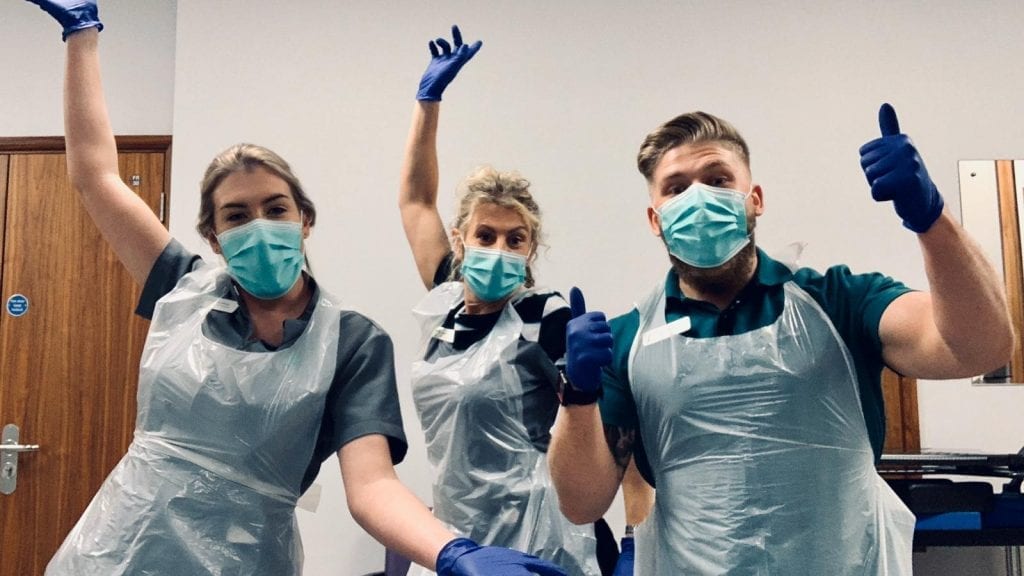- Patients
- Exploring cancer care
- Conditions we treat
- Leukaemia
- Acute myeloid leukaemia
Introduction
Acute myeloid leukaemia
Acute myeloid leukaemia treatment
We are specialists in the latest techniques for diagnosing and treating all types of cancer, including acute myeloid leukaemia. We have teams of highly trained cancer specialists that are experts in this disease who work together to evaluate the newest, evidence-based approaches so we can offer these to every patient – without delay.

Treatment overview
Chapter 1
Treatment overview
Treatment for Acute myeloid leukaemia (AML) may include chemotherapy, growth factors, targeted therapy, immunotherapy, transplants and radiotherapy. We combine this with consultant-led integrative care, such as wellbeing therapies and psychological support, to help you achieve the best possible outcome. Our qualified physiotherapists and wellbeing consultants will carefully plan these therapies tailored to your needs by working with you and your consultant.
Acute myeloid leukaemia is a type of blood cancer that affects specific types of white blood cells called granulocytes or monocytes. These cells develop in the bone marrow from stem cells called myeloid stem cells. Acute myeloid leukaemia develops quickly and aggressively over a few weeks or months, so it is important to start treatment as soon as possible.
Acute myeloid leukaemia can develop in both adults and children, but it mostly affects older people. According to Cancer Research UK, there are around 3,200 new cases of AML diagnosed in the UK every year. Early diagnosis and the right treatments at the right time enable improved outcomes for many patients.
Other types of leukaemia are:
- Acute lymphoblastic leukaemia (ALL)
- Chronic myeloid leukaemia (CML)
- Chronic lymphocytic leukaemia (CLL)
We are the UK’s leading specialist private cancer care provider. By choosing us, you can be reassured that your treatment will be managed by a team of specialists working together with you, to decide the best personalised care plan for your diagnosis.
It is our commitment to offering world-class care to every patient with cancer.
How is acute myeloid leukaemia treated?
There are a number of options of treatment available for acute myeloid leukaemia at GenesisCare, such as:
- Chemotherapy – anti-cancer (cytotoxic) drugs which destroy cancerous the cells
- Growth factors – natural compounds that help the bone marrow to replace damaged white blood cells and stem cells
- Targeted therapy – a specialised group of drugs that attack or block certain processes in the cancer cells, causing them to die
- Immunotherapy – drugs that help your body’s immune system recognise and fight the cancer
- Transplants – replace abnormal blood cells and damaged stem cells
- Radiotherapy – high-energy radiation beams which are targeted at the cancer cells
Contact Us
These web pages provide more information about acute lymphoblastic leukaemia treatment at GenesisCare. If you would like to contact us in confidence, we will be happy to answer any of your questions.
Diagnostics
Chapter 2
Diagnostics
How is acute myeloid leukaemia diagnosed?
At GenesisCare, we diagnose and treat a wide range of cancers. We understand that this can be a very worrying time for you. Our diagnostic services are first-class and our commitment is to give you the answers you need, as quickly as possible. It’s important to remember that symptoms can often be caused by conditions other than acute myeloid leukaemia. Whatever your diagnosis, we can make sure you get the expert care you need and without delay.
If you’re concerned about acute myeloid leukaemia symptoms, we offer fast access to specialist acute myeloid leukaemia tests and diagnostics. We also offer a dedicated Rapid Access Haematology Service at some of our centres. Here you’ll see one of our expert consultant haematologists who specialise in blood and bone marrow cancers. They’ll assess your symptoms and, if necessary, refer you for diagnostic tests such as blood tests, bone marrow aspirate biopsy, an ultrasound scan or PET/CT scan. Appointments are usually available within 24 hours.
Acute myeloid leukaemia symptoms
Symptoms of acute myeloid leukaemia develop over a short period of time and usually become more noticeable as your body produces more immature white blood cells. Typical symptoms are common to other illnesses, so they can be challenging to spot.
Signs may include:
- Fatigue
- Breathlessness
- High temperature and sweating
- Pale skin if you have white skin or greyish skin if you have brown or black skin
- Red or purple spots on your skin
- Bruising and bleeding
- Lumps or swelling
- Pains in your bones or joints
- Abdominal discomfort
- Repeated infections
If you have any concerns, you should seek medical advice or book an appointment through our Rapid Access Haematology Service.
Rapid Access Haematology Service
Our specialist team of haematology consultants can assess and diagnose conditions quickly so you can get the answers you need and plan any treatment immediately.
Drug treatments
Chapter 3
Drug treatments
At GenesisCare, we offer all drug therapies that can be used to treat and manage acute myeloid leukaemia, including many of the newest treatments. Depending on how these treatments are given to you, you may need to attend one of our private chemotherapy suites which are staffed by our specialist nurses. Our compassionate nursing teams are available 24/7 on a dedicated on-call telephone service, and they can answer any queries during your treatment. They’ll be able to provide advice about side effects or symptoms and help arrange appropriate medical care when needed.
Our centres have all received the Macmillan Quality Environment Mark to reflect the high quality of care we provide for people living with cancer.
There are different types of drug treatments, also called systemic anti-cancer therapies. Our expert teams continually review and assess new treatments to make these available to GenesisCare patients as early as possible.
Some acute myeloid leukaemia treatments are best offered within hospital facilities. If your consultant recommends a treatment as an in–patient stay, this can be arranged conveniently at one of our partner hospitals. You can then continue your other treatments at GenesisCare.
Chemotherapy for acute myeloid leukaemia
Chemotherapy uses cytotoxic (anti-cancer) drugs to destroy cancer cells and it’s the primary treatment for acute myeloid leukaemia. Chemotherapy can be delivered on its own or in combination with other therapies such as leukapheresis, which filters excessive white blood cells from the body.
When treating your acute myeloid leukaemia, chemotherapy can be given in two phases, and each phase can be made up of multiple cycles:
- Induction phase – this phase aims to kill all leukaemia cells
- Consolidation phase – a combination of chemotherapy drugs are administered to stop acute myeloid leukaemia coming back when there are no signs of cancer (remission)
Your doctor may recommend a course of high-dose chemotherapy if initial treatment doesn’t improve your condition. This intensive chemotherapy can successfully treat acute myeloid leukaemia. If eligible, you’ll need to have a bone marrow or stem cell transplant alongside this treatment.
Growth factors for acute myeloid leukaemia
Growth factors are natural compounds that stimulate the bone marrow to produce more white blood cells and stem cells. Granulocyte colony stimulating factor (G-CSF) is a type of growth factor that can be used to help manage the side effects of acute myeloid leukaemia treatments. It is usually given to you as an injection under your skin or through a drip into your bloodstream. You may have G-CSF:
- After chemotherapy to increase the number of white blood cells in your body and reduce your risk of infection
- Before or after a stem cell transplant to increase the number of stem cells in your blood
Targeted therapy for acute myeloid leukaemia
Targeted (also called biological) therapies are a specialised group of drugs that are designed to attack or block certain processes in cancer cells that tumours depend on to survive and grow. The main type of targeted therapy for acute myeloid leukaemia are hypomethylating agents (HMAs), and you may have these if you’re unsuitable for chemotherapy. They work by interfering with the regulation of genes inside leukaemia cells that are dividing rapidly, causing them to die.
Recently, novel drugs targeting the FLT3 and Bcl–2 proteins in leukaemia cells have also shown great promise in treating acute myeloid leukaemia patients.
Immunotherapy for acute myeloid leukaemia
Immunotherapies work by helping your body’s immune system to recognise and fight the cancer. Acute myeloid leukaemia can be treated with monoclonal antibodies (MABs). MABS specifically target receptors found outside of leukaemia cells, when they attach to the receptor, your body’s immune system is triggered to attack and kill the leukaemia cells.
Palliative care
If your cancer has responded to treatments poorly or has come back after treatment, it’s called advanced or relapsed acute myeloid leukaemia. At GenesisCare, you can receive palliative drug treatment or radiotherapy for advanced acute myeloid leukaemia, to reduce the progression of your cancer and ease any symptoms.
Personalised medicine
For some advanced cancers, we use specialist tests, such as liquid biopsy or genomic testing, to understand the genetic make-up of cancer cells. This helps us to identify which drugs are available to work against the particular genetic mutations in a cancer, allowing us to start effective treatment without delay.
Clinical trials
There may be opportunities to access clinical trials for the newest treatments for acute myeloid leukaemia. Clinical trials can be considered a suitable treatment option if you’ve exhausted standard therapies or evidence suggests the trial treatment will be more successful at treating your condition. Your haematologist will discuss these opportunities in more detail with you.
Drug treatment side effects
No treatment is without side effects. Your doctor will explain these to you depending on your drug treatment, together with the ways your treatment plan and supportive care can help manage or minimise these.
Transplants
Chapter 4
Transplants
Transplants are often used to replace abnormal white blood cells with new cells produced by a set of stem cells from a donor and form part of an overall treatment and care plan for acute myeloid leukaemia.
Our consultants themselves, or in association with other leading haematologists who are experts in transplants for blood and bone marrow cancers, will plan this treatment. If your consultant recommends a transplant, this can be arranged conveniently at one of our partner hospitals. You can then continue your other treatments at GenesisCare.
Stem cell and bone marrow transplants
Stem cells are early types of cells found in your bone marrow. They can develop into red blood cells, white blood cells and platelets. Stem cell and bone marrow transplants replace the abnormal white blood cells when treating acute myeloid leukaemia.
Stem cell transplants are used more often than bone marrow transplants for treating acute myeloid leukaemia. You’ll usually have what’s called an allogeneic stem cell transplant, where the stem cells are from either related or unrelated donor. You can rarely have an autologous stem cell transplant, where the stem cells are your own.
You may need a transplant for acute myeloid leukaemia if your condition:
- Is in remission but is likely to come back
- Has not responded to other treatments
Transplant side effects
No treatment is without side effects. Your doctor will explain these to you, together with the ways your treatment plan and supportive care can help manage or minimise these.
Radiotherapy
Chapter 5
Radiotherapy
Radiotherapy uses targeted, high-energy radiation beams to destroy cancer cells. It’s not usually the first treatment option for acute myeloid leukaemia patients. However, it can be used before a transplant or to treat cancers which have spread outside the bone marrow to the brain or spinal cord.
At GenesisCare, we are the leading private provider of radiotherapy in the UK. We offer world-class expertise, state-of-the-art facilities and advanced radiotherapy techniques. Our latest-generation radiotherapy machines (called linacs) deliver highly targeted radiation beams that are designed to be effective while minimising the radiation dose to healthy tissues.
Your treatment will be governed by our expert multidisciplinary teams (MDTs), consisting of oncologists, radiotherapists and medical physicists. They’ll who work together to ensure that you receive only the best possible care.
Radiotherapy techniques for acute myeloid leukaemia
Total body irradiation (TBI) where radiation is delivered to your whole body is used to help kill leukaemia cells in the bone marrow before a bone marrow or stem cell transplant.
Stereotactic radiosurgery (SRS) is available to patients with advanced acute myeloid leukaemia that has spread to the brain or spinal cord. Despite its name, SRS is not surgery. It’s a painless procedure which precisely delivers multiple beams of radiation to brain and spinal tumours, sometimes in a single treatment session.
Side effects of radiotherapy
No treatment is without side effects. Your doctor will explain these to you before you start your course of radiotherapy, together with ways your treatment plan and supportive care can help manage or minimise these.
Integrative care
Chapter 6
Integrative care
At GenesisCare, we do more than just treat your cancer. As part of our unique and integrative approach to cancer care, you can expect the best possible care and a personalised treatment plan. This will include access to life-changing therapies which are proven to improve cancer-related outcomes. These therapies will be tailored to you to help you manage and cope with your cancer as well as the specific side effects of treatment.
Exercise medicine
Exercise medicine is a personalised programme of carefully planned and supported physical activity that has been shown to improve outcomes for cancer patients, enhancing quality of life and limiting the impact of cancer, such as by improving strength and reducing fatigue. One of our physiotherapists specialising in exercise for people living with cancer will provide a 12-week programme tailored to your needs and supported by our dedicated GenesisCare Exercise Medicine app. They’ll work closely with you to monitor changes in your health and support you throughout the programme to help you get the best results. This is available at selected GenesisCare centres.
Wellbeing
We also offer a wellbeing expert and holistic therapies such as counselling, acupuncture, massage and reflexology through our unique partnership with the Penny Brohn UK charity. This service is available to all acute myeloid leukaemia patients at any of our 14 UK centres.
Why choose us?
Chapter 7
Why choose us?
GenesisCare is a leading private provider of cancer care, offering the latest innovations and techniques that are proven to be safe and effective. If you choose us for acute myeloid leukaemia treatment, you’ll be under the care of a team of experts, including consultant haematologists and oncologists. They’ll design a personalised care plan based around your diagnosis and preferences, with treatment starting within days if needed. Every patient is also supported through their journey with life-changing therapies, such as exercise medicine and psychological support.
Our dedicated cancer centres are convenient and easy-to-access. You can use your private medical insurance and we‘re recognised by all leading insurers.
We are proud that so many patients rate our care as excellent as we help them through their cancer journey. Find out more about the unique experiences from people who have had their cancer diagnosis or treatment at GenesisCare in our patient stories section.
Read next

Our centres
Across the world, GenesisCare has more than 440 centres, bringing specialist care closer to our patients in the...

Our doctors
GenesisCare works with many leading and experienced cancer doctors who share our commitment to providing excellent patient care

How can we help you
We are the UK’s leading private provider of advanced radiotherapy and cancer care.

Diagnostic clinics
Get fast, direct access to a consultant and diagnostic tests and scans so you can get answers as...